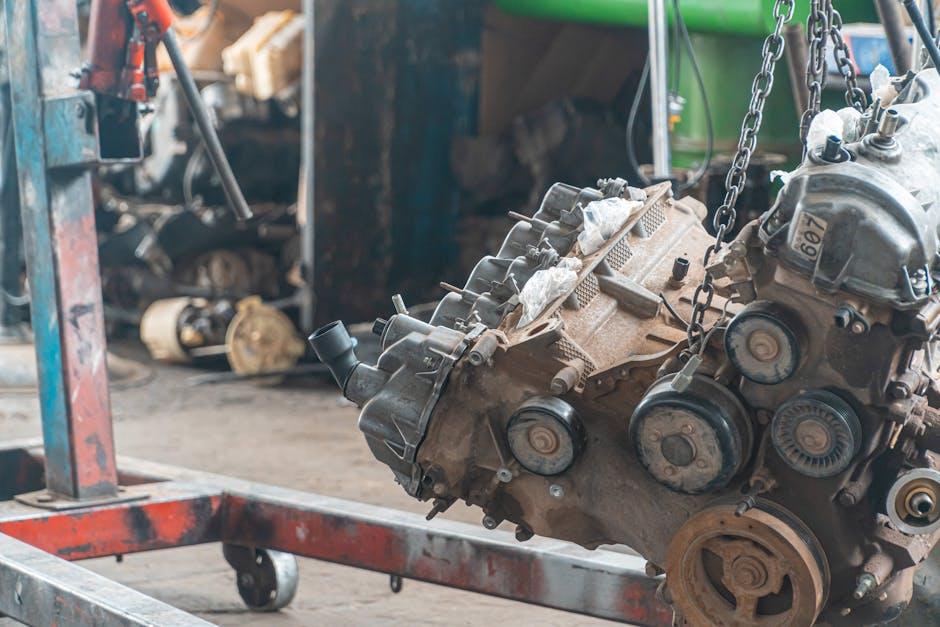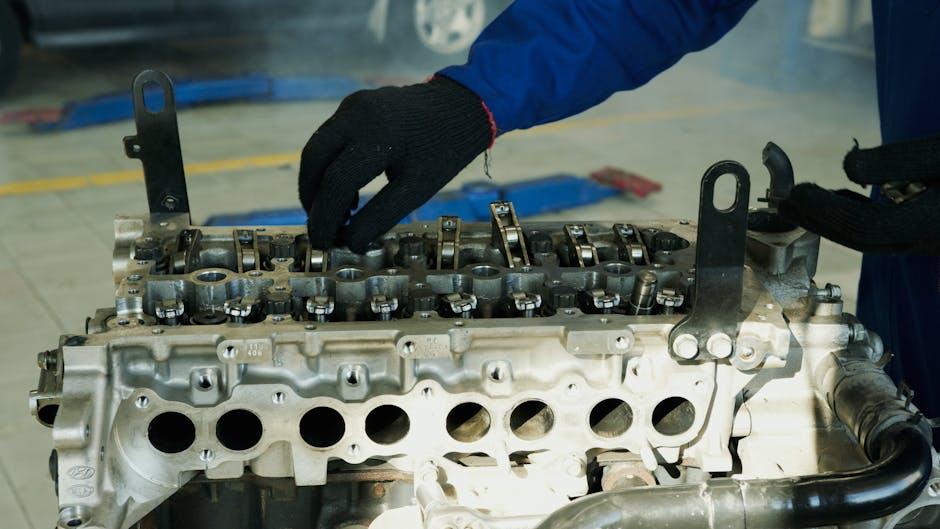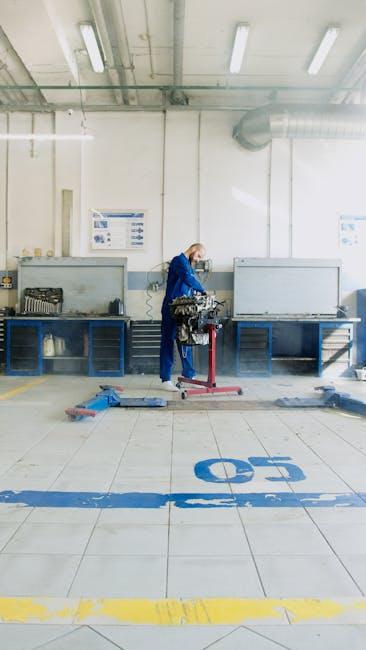When your vehicle’s transmission starts acting up, the search for a trustworthy repair shop can feel like navigating a maze without a map. The transmission is the heart of your car’s performance, and choosing the right experts to mend it isn’t a decision to take lightly. With countless options and varying levels of expertise, how do you separate the dependable from the dubious? This guide will help you steer through the process, equipping you with practical tips and insights to find a reliable transmission repair shop that keeps your vehicle—and your peace of mind—running smoothly.
Table of Contents
- Understanding Your Transmission Problems Before Seeking Help
- Evaluating Certifications and Technical Expertise of Repair Shops
- Reading Reviews and Gathering Recommendations from Trusted Sources
- Assessing Warranty Offers and Transparency in Pricing
- Visiting the Shop to Gauge Professionalism and Customer Service
- Comparing Diagnostic Methods and Repair Technologies Used
- Q&A
- The Conclusion

Understanding Your Transmission Problems Before Seeking Help
Identifying the root cause of transmission issues before visiting a repair shop can save both time and money. Start by paying attention to common symptoms such as slipping gears, unusual noises, delayed engagement, or fluid leaks. Keep in mind that not all symptoms point to the same problem; some may indicate minor maintenance needs like a fluid change, while others could be signs of severe mechanical failure. Documenting these symptoms in detail will help the technicians understand the urgency and provide a more accurate diagnosis.
Before scheduling a visit, try performing some basic checks yourself. Here are a few key points to consider:
- Fluid Level and Condition: Check for low fluid levels or burnt-smelling transmission fluid, which can indicate overheating or internal damage.
- Dashboard Warning Lights: Note if any transmission-related warning lights are illuminated.
- Driving Behavior: Observe if problems worsen under certain driving conditions like uphill climbs or heavy traffic.
Getting familiar with these details empowers you to communicate more effectively with professionals and ensures you’re getting the right service for your vehicle’s unique needs.

Evaluating Certifications and Technical Expertise of Repair Shops
When selecting a transmission repair shop, the certifications held by the technicians offer invaluable insight into the shop’s professionalism and technical prowess. Look for industry-recognized credentials such as ASE (Automotive Service Excellence) certification, which signifies a technician’s proven expertise and commitment to ongoing education. Additionally, certifications from specific transmission manufacturers can be a strong indicator of specialized knowledge, ensuring that your transmission receives tailored care aligned with the latest technological advances.
Beyond certificates, evaluating the shop’s technical capabilities is equally important. Pay attention to whether the facility is equipped with modern diagnostic tools, including computerized transmission analyzers, which help identify problems accurately and reduce guesswork. Here’s a quick checklist to guide your evaluation:
- ASE Certified Technicians – Validates technical proficiency.
- Modern Diagnostic Equipment – Ensures precise troubleshooting.
- Manufacturer-Specific Training – Confirms specialization in your transmission type.
- Warranty on Repairs – Reflects confidence in workmanship and parts.
| Certification | Meaning | Why It Matters |
|---|---|---|
| ASE Certified | Industry-wide technician standard | Evidence of technical skill and ethical standards |
| Manufacturer Training | Brand-specific expertise | Specialized handling of your vehicle’s transmission |
| Equipment Calibration | Up-to-date tools and procedures | Accurate diagnostics to prevent misrepair |

Reading Reviews and Gathering Recommendations from Trusted Sources
Before entrusting your vehicle’s transmission to any shop, delve into the experiences of past customers. Exploring online reviews on platforms like Google, Yelp, and specialized automotive forums gives invaluable insights into the quality and reliability of various repair centers. Look for patterns in feedback—consistent praise for honest communication, timely service, and skilled workmanship points to a dependable shop. Conversely, recurring complaints about delays, unexpected charges, or poor results should raise red flags. Focus on reviews that provide specific details rather than generic statements, as these offer a clearer picture of what you can expect.
Gathering recommendations from friends, family, or colleagues who have firsthand experience with transmission repairs can significantly narrow down your options. Trusted sources often provide balanced opinions and can share nuanced information beyond online reviews. When seeking suggestions, consider asking about:
- Communication style: Were they informed about repair options and costs upfront?
- Turnaround time: Did the shop complete work within a reasonable period?
- Warranty offered: Is there a guarantee for the repair work done?
These shared details, combined with online research, help build a well-rounded image of the shop’s reputation and professional ethics, enabling you to make a confident choice for your vehicle’s transmission needs.

Assessing Warranty Offers and Transparency in Pricing
Understanding the warranty terms is crucial when selecting a transmission repair shop. A transparent shop will clearly outline what parts and labor are covered, the duration of the warranty, and any conditions that apply. Ask if the warranty is backed by the manufacturer or the shop itself, and whether it can be transferred if you sell your vehicle. This clarity not only protects your investment but also demonstrates the shop’s confidence in the quality of their work.
Transparency in pricing goes beyond just the final bill—it means knowing upfront how costs are calculated and what services are included. Reputable repair shops provide detailed estimates and avoid hidden fees, empowering you to make an informed decision. When comparing options, look for shops that offer:
- Itemized quotes breaking down parts, labor, and taxes
- Explanations of why certain repairs or replacements are necessary
- Clear communication about potential additional costs
| Warranty Feature | Ideal Transparency |
|---|---|
| Coverage Length | Minimum 12 months or 12,000 miles |
| Transferability | Yes, if vehicle is sold |
| Parts & Labor Included | Both fully covered |
| Pricing Disclosure | Detailed, upfront estimate |

Visiting the Shop to Gauge Professionalism and Customer Service
Stepping into a transmission repair shop offers an immediate feel for their professionalism and customer service. Observe how the staff greets you upon arrival—are they courteous, attentive, and eager to answer questions? A reliable shop will have a clean and organized waiting area, reflecting their respect for customers and attention to detail. Don’t hesitate to ask about certifications or experience; professionals are proud to share their qualifications and past successes.
Pay attention to communication styles and response times when discussing your vehicle’s needs. Transparent shops will:
- Explain diagnoses clearly without jargon
- Provide realistic estimates and timelines
- Offer warranties or guarantees on repairs
- Show genuine concern for your vehicle’s longevity
| Customer Interaction Aspect | What to Expect |
|---|---|
| Greeting | Warm, respectful, prompt |
| Clarity | Simple, transparent explanations |
| Estimate Delivery | Accurate and timely |
| Follow-Up | Consistent and informative |

Comparing Diagnostic Methods and Repair Technologies Used
One of the most crucial steps in transmission repair is accurate diagnostics. Modern shops typically employ a variety of methods such as advanced computer diagnostics, fluid analysis, and road testing to pinpoint issues. Computer diagnostics help identify electronic sensor faults and error codes, offering a detailed look into the transmission’s health, while fluid analysis can reveal contamination, wear metals, or overheating signs. Road tests then provide real-world performance data to confirm the problem’s nature. Each method contributes uniquely, and a shop that combines these techniques usually delivers more reliable results.
When it comes to repair technologies, the focus should be on precision and durability. Many reputable shops utilize state-of-the-art equipment like transmission rebuilding machines, digital calibration tools, and OEM parts to ensure quality outcomes. The choice between repairing versus replacing components also depends on the shop’s technological expertise and willingness to match parts with manufacturer specifications. Below is a simple comparison to illustrate:
| Method | Advantages | Considerations |
|---|---|---|
| Computer Diagnostics | Fast, detailed error detection | Requires updated software and trained technicians |
| Fluid Analysis | Detects wear and fluid condition early | May not reveal mechanical faults |
| Road Test | Confirms symptoms under real conditions | Subjective results; depends on tester expertise |
| Rebuilding Machines | Precision assembly and measurement | Investment heavy; needs technician skill |
Q&A
Q&A: How to Choose a Reliable Transmission Repair Shop
Q1: Why is choosing the right transmission repair shop so important?
A1: Your transmission is one of the most complex and essential parts of your vehicle. A quality repair shop ensures the job is done correctly, extending the life of your car and saving you money on future repairs. A bad repair can lead to bigger issues, unsafe driving conditions, and costly replacements.
Q2: What are the first signs that indicate a transmission problem?
A2: Common signs include slipping gears, delayed shifting, strange noises like whining or clunking, fluid leaks, and burning smells. If you notice any of these, it’s time to find a trustworthy repair specialist before small issues become major headaches.
Q3: How can I verify the credibility of a transmission repair shop?
A3: Start by checking online reviews and ratings on platforms like Google, Yelp, or the Better Business Bureau. Look for consistent positive feedback about their expertise and customer service. Certifications from automotive organizations (such as ASE) and years of experience add to their credibility.
Q4: Should I prefer a dealership or an independent repair shop?
A4: Both have pros and cons. Dealerships typically have manufacturer-trained specialists and original parts but might charge more. Independent shops can offer personalized service and competitive pricing. The key is their reputation and expertise, not just affiliation.
Q5: What questions should I ask before committing to a repair shop?
A5: Inquire about the technicians’ qualifications, warranty on parts and labor, the diagnostic process, turnaround time, and estimated costs. Transparent communication and willingness to explain the problem and the repair plan are good indicators of reliability.
Q6: How important is the warranty on transmission repairs?
A6: Extremely important. A solid warranty shows the shop stands behind their work. Typical warranties range from 12 months/12,000 miles to longer periods. Always get warranty details in writing before authorizing repairs.
Q7: How can I avoid getting scammed or overcharged?
A7: Get multiple estimates, ask for detailed invoices, and be wary of shops that pressure you into immediate decisions. A trustworthy shop will provide clear explanations, involve you in the decision-making process, and avoid unnecessary repairs.
Q8: What role does transmission fluid play, and should a shop check it?
A8: Transmission fluid is essential for lubrication and proper shifting. A reliable shop will check the fluid’s condition and level as part of their diagnostic. Old, dirty, or low fluid can cause many transmission issues and might be a simple fix.
Q9: Is it better to repair or replace a transmission?
A9: It depends on the damage extent and cost. A repair shop should provide an honest assessment whether rebuilding, repairing specific components, or replacing the entire transmission is the best option for your situation.
Q10: Can regular maintenance prevent major transmission issues?
A10: Absolutely. Routine checks, fluid changes, and prompt attention to minor symptoms can prevent catastrophic failures. A good transmission repair shop often offers maintenance services and advice to keep your vehicle running smoothly.
Choosing a reliable transmission repair shop isn’t just about convenience—it’s about protecting your investment and safety on the road. Ask questions, do your homework, and trust your instincts to find a shop that treats your vehicle like their own.
The Conclusion
Choosing a reliable transmission repair shop doesn’t have to be a daunting task. By doing your homework, asking the right questions, and trusting your instincts, you can find a place that not only fixes your car but also gives you peace of mind. Remember, your vehicle’s transmission is the heart of its movement—treat it with the care it deserves by entrusting it to skilled hands. In the end, a little diligence today can save you from costly surprises tomorrow, keeping your journey smooth and your confidence high.


2 Comments
k55dw9
k55dw9